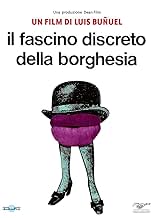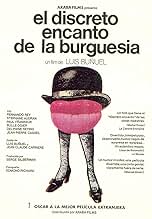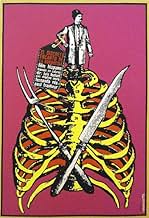AVALIAÇÃO DA IMDb
7,7/10
49 mil
SUA AVALIAÇÃO
Uma série de sonhos surrealistas, praticamente sem tramas, centrada em seis pessoas de classe média e suas tentativas constantemente interrompidas de comer juntas.Uma série de sonhos surrealistas, praticamente sem tramas, centrada em seis pessoas de classe média e suas tentativas constantemente interrompidas de comer juntas.Uma série de sonhos surrealistas, praticamente sem tramas, centrada em seis pessoas de classe média e suas tentativas constantemente interrompidas de comer juntas.
- Direção
- Roteiristas
- Artistas
- Ganhou 1 Oscar
- 7 vitórias e 9 indicações no total
Stéphane Audran
- Alice Sénéchal
- (as Stephane Audran)
- Direção
- Roteiristas
- Elenco e equipe completos
- Produção, bilheteria e muito mais no IMDbPro
Avaliações em destaque
La Charme Discret de la Bourgeoisie is a celebrated film by a well-regarded surrealist auteur. Given that, and given my taste for such things, I went in with high hopes. But I rarely found it more than mildly amusing.
It's undeniably clever. Bunuel's dry humor sparkles, and his gentle social critique hits its marks more often than not. The penultimate shot of Fernando Rey with a slice of ham stuffed in his mouth is one of the funniest and most memorable cinematic images I've encountered in quite a while. And Delphine Seyrig breezes through her scenes with hilariously blithe detachment. But the parts don't quite add up to a greater whole.
The film reaches its peak about halfway through, once a pattern has been established (dinner parties will be attended, but dining will be teasingly withheld) and the central narrative has begun to digress and fragment. As the surreal intrudes upon the quotidian, a delicious sort of suspense sets in. Pity, then, that the last forty-five minutes squander this tension, retreating to tepid farce and a rather obvious critique of upper-crust social mores.
Someone on the film's board once quoted the director as saying, "the bourgeois moral is the immoral thing for me, that which should be combated; the moral founded in our unjust social institutions as the religion, the homeland, the family, the culture, in short, the so-called pillars of the society." Thematically, the film consists of variations on this familiar counter-cultural conceit, and such thinking was certainly voguish in the late 60s and early 70s. It's an interesting and potentially valid argument, but I found the film's handling of the idea superficial, even clichéd.
The same could be said, I suppose, of El Topo or Sweet Movie, but those films transcend glib adherence to fashionable ideologies and period style. I don't think La Charme Discret does that. Of course, it's more an urbane, low-key comedy of manners than a flaming art-bomb thrown through the window of middlebrow complacency, so perhaps the comparison is unfair. As a comedy, it is appealing, in a mild sort of way.
Finally, I was disappointed by the film's look. I understand that the bland stage-set dining rooms are a device, and a successful one. But surreal detours aside, there isn't much to look at. The camera placements and movements are almost ploddingly ordinary, and while they capture the events adequately, they don't do anything interesting with them.
I'm being unkind, of course, and terribly unfair. By stressing these complaints, I'm giving short shrift the wonderful performances and amusingly understated comic dialog. I'm overlooking the fabulously eerie dream sequences and Bunuel's masterful control of tone. I gave La Charme Discret a 7/10 because it IS charming, funny and somewhat intellectually intriguing. But I still came out of the experience feeling a bit let down...
It's undeniably clever. Bunuel's dry humor sparkles, and his gentle social critique hits its marks more often than not. The penultimate shot of Fernando Rey with a slice of ham stuffed in his mouth is one of the funniest and most memorable cinematic images I've encountered in quite a while. And Delphine Seyrig breezes through her scenes with hilariously blithe detachment. But the parts don't quite add up to a greater whole.
The film reaches its peak about halfway through, once a pattern has been established (dinner parties will be attended, but dining will be teasingly withheld) and the central narrative has begun to digress and fragment. As the surreal intrudes upon the quotidian, a delicious sort of suspense sets in. Pity, then, that the last forty-five minutes squander this tension, retreating to tepid farce and a rather obvious critique of upper-crust social mores.
Someone on the film's board once quoted the director as saying, "the bourgeois moral is the immoral thing for me, that which should be combated; the moral founded in our unjust social institutions as the religion, the homeland, the family, the culture, in short, the so-called pillars of the society." Thematically, the film consists of variations on this familiar counter-cultural conceit, and such thinking was certainly voguish in the late 60s and early 70s. It's an interesting and potentially valid argument, but I found the film's handling of the idea superficial, even clichéd.
The same could be said, I suppose, of El Topo or Sweet Movie, but those films transcend glib adherence to fashionable ideologies and period style. I don't think La Charme Discret does that. Of course, it's more an urbane, low-key comedy of manners than a flaming art-bomb thrown through the window of middlebrow complacency, so perhaps the comparison is unfair. As a comedy, it is appealing, in a mild sort of way.
Finally, I was disappointed by the film's look. I understand that the bland stage-set dining rooms are a device, and a successful one. But surreal detours aside, there isn't much to look at. The camera placements and movements are almost ploddingly ordinary, and while they capture the events adequately, they don't do anything interesting with them.
I'm being unkind, of course, and terribly unfair. By stressing these complaints, I'm giving short shrift the wonderful performances and amusingly understated comic dialog. I'm overlooking the fabulously eerie dream sequences and Bunuel's masterful control of tone. I gave La Charme Discret a 7/10 because it IS charming, funny and somewhat intellectually intriguing. But I still came out of the experience feeling a bit let down...
"The Discreet Charm of the Bourgeoisie", a leisurely paced, incisive satire on social mores and class hypocrisy, opens with a group of friends arriving on the wrong day of a dinner engagement. this is only the begining of a succession of unexpected and unusual events to follow. The dinner party is the movie's main setting and it is there that reality and illusion often times blend imperceptibly together. The film is structured as a series of surreal sequences, which prompted esteemed film critic Pauline Kael to opine 'His(Director Louis Bunuel) indifference to dramatic logic is complete.' And how. Bunuel's narrative plays an elaborate game with the viewer through it's subconscious imagery and audacious use of time. His tendency to experiment with technique and form often times led to discovery and innovation. The cinema of Louis Bunuel invariably deals with the discrepancy between appearance and reality; decorum and desire. His world view was subversive and anarchistic. He was a cheerful pessimist, skeptical but not susceptible to Bergmanian despair. His skepticism extended to all of those he found playing too neat a social game. The filmmaker's career was one sustained assault on authoritarianism. Witness an indiscreet character in the film who claims: 'No one system can help the masses acquire refinement.' He believed man was, unconsciously, a slave to custom and aimed to shock viewers out of their unthinking acceptance of established values. "The Discreet Charm of the Bourgeoisie"(An Academy Award winner in 1972 for Best Foreign Film) is a boldly inventive picture. Dozens of frames are filled with clever filmic devices: environmental noises increase inordinately during routine conversations; an ambiguous procession is inserted freely within the text. These cinematic ploys add intrigue to the already peculiar goings-on. The walk by the main group of characters along a country roadside is mysterious and compelling. The players are noticeably silent and contemplative. Is this an anxious dream? The afterlife? An insignificant flashback? Whichever, the recurring sequence underscores the obliqueness and cool obscurity of the film. One might not identify closely with the disenchanted Bunuelian sensibility or the unsentimental stance he takes, however one knows immediately and unmistakably that they are in the gifted hands of a film technician like a Godard or Kurosawa. A director in complete control of his medium. A highly personal filmmaker frequently referred as 'a poet of hallucination who follows the caprices of his fantastical imagination.' Someone whose fanciful paths of creation were invariably led by the irrational. "The Discreet Charm of the Bourgeoisie", with it's arresting mixture of calculation and carelessness, remains a unique and influential movie. The acerbic films of Robert Altman and the perverse mischievousness of the Coen brothers films, to mention but a few, pay a large debt to the strange universe and unconventional perspective of Louis Bunuel. Film lovers uninitiated in surrealist cinema will find "The Discreet Charm of the Bourgeoisie" an alluring and beguiling crash course.
There are not many artists who could tell the same joke over and over again and get away with it creating the film as brilliant, funny, absurd, witty, and clever as Buñuel's "The Discreet Charm of the Bourgeoisie", 1972. The story of six friends who try to arrange and have a nice dinner together but cannot complete (or even start) their meal does not sound very exiting but wait until you watch this comedy. I've always known how interesting surrealism is but I never thought how funny it could be. I've seen the film four or five times - it only gets better with each viewing. Highly recommended.
9.5/10.
9.5/10.
Director Luis Bunuel is often described as a surrealist, but the word misapplied in reference to his later works, where the the term absurdism is much more appropriate. Such is the case with the Academy Award-winning THE DISCREET CHARM OF THE BOURGEOISIE, which begins with four friends who arrive at their hosts' home only to discover they have arrived on the wrong night--a plausible situation. But before the film has run its course, Bunuel unravels his tale of a meal that never quite happens in the most unexpected ways imaginable.
The film works on several levels, mocking social conventions, the church, and eventually spilling its action into a series of overlapping nightmares in which various attempts to dine are frustrated by everything from the corpse of a restaurant manager in a nearby room to military maneuvers. On one memorable occasion, the friends are invited to dine and are seated around an elegant table--when a curtain suddenly rises behind them and reveals them to be seated on a stage before a hostile audience! The cast (which features Fernando Rey, Delphine Seyrig, Paul Frankeur, Bulle Ogier, Stephane Audran and Jean-Pierre Cassel as the constantly frustrated diners) plays with considerable aplomb, performing the most irrational scenes with a magnificent realism. When combined with Bunuel's absurdist story, the result is a disquieting yet often very funny discourse on frustrated appetites both real and imagined, and with many layers of incidental meaning along the way.
A word of caution to the uninitiated: Bunuel is not for those who seek a tidy plot line with clear-cut meanings. But if you come to it with an open mind, you'll find plenty of food for thought!
Gary F. Taylor, aka GFT, Amazon Reviewer
The film works on several levels, mocking social conventions, the church, and eventually spilling its action into a series of overlapping nightmares in which various attempts to dine are frustrated by everything from the corpse of a restaurant manager in a nearby room to military maneuvers. On one memorable occasion, the friends are invited to dine and are seated around an elegant table--when a curtain suddenly rises behind them and reveals them to be seated on a stage before a hostile audience! The cast (which features Fernando Rey, Delphine Seyrig, Paul Frankeur, Bulle Ogier, Stephane Audran and Jean-Pierre Cassel as the constantly frustrated diners) plays with considerable aplomb, performing the most irrational scenes with a magnificent realism. When combined with Bunuel's absurdist story, the result is a disquieting yet often very funny discourse on frustrated appetites both real and imagined, and with many layers of incidental meaning along the way.
A word of caution to the uninitiated: Bunuel is not for those who seek a tidy plot line with clear-cut meanings. But if you come to it with an open mind, you'll find plenty of food for thought!
Gary F. Taylor, aka GFT, Amazon Reviewer
A satire on everyone who's too big for their boots (or secretly wants 2 B), because they will not achieve the aims they pursuit and are ultimately doomed to be separated from their privileges when they wake up to reality. The story may also come across as remote parody on The Last Supper, but from the bourgeois point of view (who never really get their supper), in contrast with 'Viridiana' (1961, Buñuel), where the poor and disabled DO get their Last Supper. But I don't know much about the bible, so I'm probably wrong about that. It proves though that you don't have to be pious to appreciate Buñuel's films; in fact, you'd better NOT be.
The 'adventure' of the protagonists is a proverbial sinking ship, because they seem to know what they want, but never reach their goal, which is quite simple and basic (to eat), because they're so caught up in supposed etiquette. They have all kinds of knowledge about manners and gestures, but they cannot sit down and eat. That is actually a fairly clear message: 'look before you leap' or 'behold the priorities of life'.
What's more indiscrete: drinking a martini the wrong way, or selling cocaine abusing your position as an ambassador and fooling around in the garden while you're having friends over for diner? And are you ultimately discrete simply because nobody discovers your subversive or criminal actions? These guys just can't control their carnal and financial lust, while complaining: 'No system can give the masses the proper social graces. But you know me, I'm not a reactionary.' Blah.
Cinematographer Edmond Richard (Le Procès (1963, Welles), Fantôme de la liberté, Cet obscur objet du désir) exhibits his excellent collaboration with Buñuel's visions. Buñuel tried before to make it easier for audiences to understand the imagery by incorporating it in a dream sequence (e.g. Tristana, 1970), but he returns here (as in Belle de Jour, 1967) to the early days (1930) where the dream sequences were just put forward as if they were reality. You'll never know what is a dream and what is real. As always, there is no music here to guide you, apart from the ringing church bells. Just open up your ears and clean out your eyes and you'll not be disappointed.
One last remark: the cover of the video is definitely one of the most applicable and distinctive covers (Ferracci) ever made, as is the cover of 'Fantôme de la liberté' (an odd-faced statue of liberty with a limp torch) by Jean-Paul Commandeur and the cover of 'Cet obscur objet du désir'. Buñuel didn't worry about the surrealism in his own life. He seemed to live in harmony with all his contradictions and hypocrisy.
10 points out of 10 :-)
The 'adventure' of the protagonists is a proverbial sinking ship, because they seem to know what they want, but never reach their goal, which is quite simple and basic (to eat), because they're so caught up in supposed etiquette. They have all kinds of knowledge about manners and gestures, but they cannot sit down and eat. That is actually a fairly clear message: 'look before you leap' or 'behold the priorities of life'.
What's more indiscrete: drinking a martini the wrong way, or selling cocaine abusing your position as an ambassador and fooling around in the garden while you're having friends over for diner? And are you ultimately discrete simply because nobody discovers your subversive or criminal actions? These guys just can't control their carnal and financial lust, while complaining: 'No system can give the masses the proper social graces. But you know me, I'm not a reactionary.' Blah.
Cinematographer Edmond Richard (Le Procès (1963, Welles), Fantôme de la liberté, Cet obscur objet du désir) exhibits his excellent collaboration with Buñuel's visions. Buñuel tried before to make it easier for audiences to understand the imagery by incorporating it in a dream sequence (e.g. Tristana, 1970), but he returns here (as in Belle de Jour, 1967) to the early days (1930) where the dream sequences were just put forward as if they were reality. You'll never know what is a dream and what is real. As always, there is no music here to guide you, apart from the ringing church bells. Just open up your ears and clean out your eyes and you'll not be disappointed.
One last remark: the cover of the video is definitely one of the most applicable and distinctive covers (Ferracci) ever made, as is the cover of 'Fantôme de la liberté' (an odd-faced statue of liberty with a limp torch) by Jean-Paul Commandeur and the cover of 'Cet obscur objet du désir'. Buñuel didn't worry about the surrealism in his own life. He seemed to live in harmony with all his contradictions and hypocrisy.
10 points out of 10 :-)
Você sabia?
- CuriosidadesThe movie includes three of Luis Buñuel's recurring dreams: a dream of being on stage and forgetting his lines, a dream of meeting his dead cousin in the street and following him into a house full of cobwebs, and a dream of waking up to see his dead parents staring at him.
- Erros de gravaçãoAfter Rafael gives the terrorist champagne, his position in the chair changes between shots.
- Citações
Rafael Acosta: You're much better suited for making love than for making war. Vamos, muchacha. Vamos.
- ConexõesFeatured in Pour le cinéma: Episode dated 16 September 1972 (1972)
Principais escolhas
Faça login para avaliar e ver a lista de recomendações personalizadas
- How long is The Discreet Charm of the Bourgeoisie?Fornecido pela Alexa
Detalhes
- Data de lançamento
- Países de origem
- Central de atendimento oficial
- Idiomas
- Também conhecido como
- El discreto encanto de la burguesía
- Locações de filme
- Empresa de produção
- Consulte mais créditos da empresa na IMDbPro
Bilheteria
- Orçamento
- US$ 800.000 (estimativa)
- Faturamento bruto nos EUA e Canadá
- US$ 82.471
- Fim de semana de estreia nos EUA e Canadá
- US$ 6.075
- 26 de jun. de 2022
- Faturamento bruto mundial
- US$ 103.230
Contribua para esta página
Sugerir uma alteração ou adicionar conteúdo ausente




































